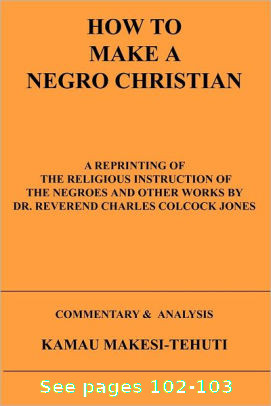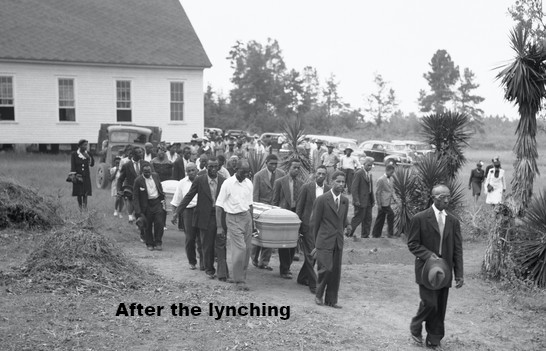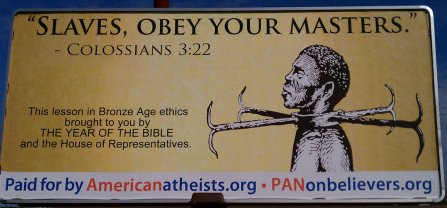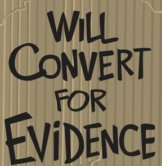
|
In the antebellum South, slavery apologists argued that they were doing
exactly what the Bible authorized them to do. Here is a compiled
bibliography of pro-slavery books from that era that used Biblical or
theological arguments:

Many who supported the enslavement of Africans likewise viewed them as inferior to White people. An Anglican minister in Barbados claimed that "Negro's were Beasts, and had no more Souls than Beasts." Africans were considered intellectually and morally inferior to Whites; some declared that they were descended from apes. Such horrific claims were used to justify the system of chattel slavery (the personal ownership of a slave) that enslaved millions of Africans. Many slaveholders convinced themselves that slaves, due to their supposedly inferior nature, were better off and better cared for in bondage than in freedom. This racist ideology led directly to America's "original sin," the institution of slavery in the New World. The first group of African slaves-four men and women-arrived at Jamestown, Virginia, in 1619. Planters quickly realized that enormous profits could be gained from importing enslaved laborers. Africans could be made to work much longer and harder in the fields. Since they were so far from Africa, they could not easily escape and return home. In addition, African slaves came from a variety of nations and cultures and thus could not easily communicate with each other to organize resistance. Most slaves came from West Africa, where some tribal leaders were willing to capture and sell other Africans for profit. Slaves became especially important to the economy of the South, where the climate and topography were more suitable for tobacco and cotton plantations. By 1860, the United States was divided into "slave" and "free" states. That year, census takers counted 3,950,540 slaves in America. While the Declaration of Independence claimed that "all men are created equal," the US Constitution determined that enslaved persons would be counted as "three-fifths of all other Persons" for purposes of government representation and taxation (Article I, Section II, Paragraph III). The Constitution permitted importing slaves until 1808, with a tax of $10 per slave (Article I, Section IX, Clause I). And it required those living in free states to return escaped slaves to their owners (Article IV, Section II, Clause III). Slavery was legal in America until 1865 and the adoption of the Thirteenth Amendment. The Fourteenth Amendment (1868) guaranteed the same rights to all male citizens; the Fifteenth Amendment (1870) made it illegal to deprive any eligible citizen of the right to vote, regardless of color. However, segregation in schools was not made illegal until Brown v. Board of Education in 1954. Jim Crow laws enforcing racial segregation were overturned by the Civil Rights Act of 1964 and the Voting Rights Act of 1965. Racism today Studies show that racism persists in America: People with "black-sounding names" had to send out 50 percent more job applications than people with "white-sounding names" to get a callback. A Black man is three times more likely to be searched at a traffic stop and six times more likely to go to jail than a White man. If a Black person kills a White person, he or she is twice as likely to receive the death sentence as a White person who kills a Black person. Blacks serve up to 20 percent more time in prison than White people for the same crimes. Blacks are 38 percent more likely to be sentenced to death than White people for the same crimes. Slavery in the Old Testament It is an unfortunate fact that slavery was an accepted part of life in the ancient world. No early society or literature questioned its existence or necessity. People in Old Testament times became slaves in a variety of ways: they were born to enslaved parents (Genesis 17:23), purchased as slaves (Genesis 37:28), or sold themselves to pay a debt (Leviticus 25:39-55). Breaking into a home was punished by enslavement (Exodus 22:3), and prisoners of war were commonly enslaved (Joel 3:6). The children of Israel enslaved the Canaanites they conquered in the Promised Land (Judges 1:28). Slaves in Israel were considered property to be bought and sold (Exodus 21:32). However, they were granted protection against murder, permanent injury, or undue physical labor (Exodus 21:20, 26; 23:12). Hebrew household slaves were included at religious meals (Exodus 12:44). Such privileges and protections were extremely rare in the ancient world. But why did the Old Testament not condemn this practice? In many ways, it did. There were several ways a Hebrew slave could be freed (a process called "manumission"). An individual could be purchased and set free (Exodus 21:8). A slave permanently injured by his master was to be set free (Exodus 21:26). Hebrews were to be held as slaves for no longer than six years (Deuteronomy 15:12). The Jubilee Year, which occurred every forty-nine years, was to free all Israelite slaves (Leviticus 25:50). But still we ask: Why did the Old Testament sanction this practice at all? Its rules minimized this evil, protected slaves from physical harm, and provided for their eventual freedom. But the New Testament gives us God's complete word on the subject.

The following is from Jefferson Davis, leader of the Confederacy It [slavery] was established by decree of Almighty God...it is sanctioned in the Bible, in both Testaments, from Genesis to Revelation...it has existed in all ages, has been found among the people of the highest civilization, and in nations of the highest proficiency in the arts...Let the gentleman go to Revelation to learn the decree of God - let him go to the Bible...I said that slavery was sanctioned in the Bible, authorized, regulated, and recognized from Genesis to Revelation... Slavery existed then in the earliest ages, and among the chosen people of God; and in Revelation we are told that it shall exist till the end of time shall come. You find it in the Old and New Testaments - in the prophecies, psalms, and the epistles of Paul; you find it recognized, sanctioned everywhere."
The Quran: Truly Mind Bending Thoughs On Slavery When you buy a Hebrew slave, he is to serve for six years; then in the seventh he is to leave as a free man without paying anything. 3 If he arrives alone, he is to leave alone; if he arrives with[b] a wife, his wife is to leave with him. 4 If his master gives him a wife and she bears him sons or daughters, the wife and her children belong to her master, and the man must leave alone. 5 "But if the slave declares: 'I love my master, my wife, and my children; I do not want to leave as a free man,' 6 his master is to bring him to the judges and then bring him to the door or doorpost. His master must pierce his ear with an awl, and he will serve his master for life. And when the forbidden months have passed, kill the idolaters wherever you find them and take them prisoners, and beleaguer them, and lie in wait for them at every place of ambush. But if they repent and observe Prayer and pay the Zakat, then leave their way free. Surely, Allah is Most Forgiving, Merciful.
I cannot wrap my mind around those who claim the bible should be the moral basis for our life. The Bible is no bases for morality. Those who claim so pick only the nice verses to best suit their own morality. Throughout the Old Testament, multiple verses condone slavery, Leviticus 25:44-46, Exodus 21:2-4 (even within the context of this verse, slavery should never be condoned) Exodus 21:20 (treatment of said slaves). Richard Nisbet in 1773 wrote a response to an antislavery pamphlet, with his own entitled "Slavery Not Forbidden by Scriptures" where he used Old Testament verses to justify slavery. Now I say that to say that to say this, Christians of today I would hope, agree that slavery is wrong and abhorrent, and they would also say that Old Testament law no longer applies. Yet the Old Testament applies when it comes to current homophobic views and when it suited their needs. "Bible View of Slavery" by John H. Hopkins 1863, is another pamphlet in which this writer concludes that even though he himself would not condone slavery in normal circumstances, he must condone it because it is justified by the bible. This makes no logical sense; it is pure mental gymnastics. Even in the New Testament slavery is mentioned and condoned by Paul who could have made a statement against slavery, which being the time of the Roman Empire was common. But no, he calls for slaves to be subservient to their masters. Colossians 3:22 "Slaves, obey your earthly masters in everything; and do it, not only when their eye is on you and to curry their favor, but with sincerity of heart and reverence for the Lord." That Greek word for slave is doulos #1401 in the Strong's Concordance, the definition is "doúlos (a masculine noun of uncertain derivation) - properly, someone who belongs to another; a bond-slave, without any ownership rights of their own. Ironically, 1401 /doúlos ("bond-slave") is used with the highest dignity in the NT - namely, of believers who willingly live under Christ's authority as His devoted followers." And this is just about slavery, not the other multitude of times where killing women, babies, and people in general, is condoned. Rape is also condoned and abortion, under gods circumstances. Now what I am about to say is the 100% truth. People imprint their sense of morality upon the bible. Christians take the verses that sound nice and then twist the others that don't and say that "they are old law" or "that is out of context" to best suit their own needs and place themselves upon a morally high pedestal. I cannot for the life of me understand anyone who can critically think and conclude that the bible is a morally righteous and godly inspired text that should be the bases for all our lives and laws. It cannot serve as a moral guide when it itself is not moral. Have Christians ever read the bible? Also, any other atheist here that regularly just reads holy scriptures due to the sheer absurdity that you find in them? It intrigues me.
Being black and being a christian does not make sense. The bible is the most pro-slavery book in print. They banned Huck Finn and the Bible is OK? (I am new to this site, if this topic was beaten to death last week, I apologize ) I grew up in a very fundamental baptist environment, and I guess I have a chip on my shoulder. The hypocrisy they have is beyond belief. The verbal gymnastics they use to get around this is astounding. Anyway, few examples--- Exodus 21:20-2120 "Anyone who beats their male or female slave with a rod must be punished if the slave DIES as a direct result,21 but they are NOT to be punished if the slave recovers after a day or two, since the slave is their PROPERTY Leviticus 25:44-4644 " 'Your male and female slaves are to come from the nations AROUND you (Africa?); from them you may buy slaves.45 You may also buy some of the temporary residents living among you and members of their clans born in your country, and they will become your property.46 You can bequeath them to your children as inherited property and can make them slaves for life, *but you must not rule over your fellow Israelites ruthlessly*. (This one fragment begets the whole "Indentured Servant" defence. Many Christians will say, But that is the OLD TESTAMENT (Tho, they don't mind getting anti gay scriptures from the Old Testament.) Well, here is the New Testament Ephesians 6:5-8 Paul states, "Servants, be obedient to your human masters with fear and trembling, in sincerity of heart, as to Christ" which is Paul instructing slaves to obey their master. Similar statements regarding obedient slaves can be found in Colossians 3:22-24, 1 Timothy 6:1-2, and Titus 2:9-10. I think we should get together and take down statutes and images of christianity, nativity scenes, etc. When asked/interviewed, the message will be-- because we are WOKE!! The bible is what the confederate states used to justify their actions, and anyone FOR the bible is pro-confederacy, pro-slavery, and anyone for the bible is AGAINST human equality and co-existence. There is not a single verse that adamantly/explicitly opposes slavery. They use some verses that say stuff like -- Treat each other with love and respect -- as an anti-slavery stance.

Religion is the opposite of freedom. God is a dictator. That's why dictators can so easily manipulate religious fundamentalists. They're used to it. The Bible in a nutshell: Obey obey obey! Or you will be punished severely.
"Now if you obey me fully and keep my covenant, then out of all
nations you will be my treasured possession. Although the whole earth is mine,"
"But this command I gave them: 'Obey my voice, and I will be your God,
and you shall be my people. And walk in all the way that I command you,
that it may be well with you."
"If you are willing and obedient, you shall eat the good of the land;"
"You are my friends if you do what I command."
"Remind them to be submissive to rulers and authorities, to be obedient,
to be ready for every good work"
"If a man sells his daughter as a servant, she is not to go free as
male servants do. If she does not please the master who has selected her
for himself, he must let her be redeemed."
"Have confidence in your leaders and submit to their authority, because
they keep watch over you as those who must give an account.
Do this so that their work will be a joy, not a burden, for that
would be of no benefit to you."
"Teach slaves to be subject to their masters in everything, to try
to please them, not to talk back to them, and not to steal from them,
but to show that they can be fully trusted, so that in every way they
will make the teaching about God our Savior attractive."
"All who are under the yoke of slavery should consider their masters
worthy of full respect, so that God's name and our teaching may not
be slandered. Those who have believing masters should not show them
disrespect just because they are fellow believers. Instead, they should
serve them even better because their masters are dear to them as fellow
believers and are devoted to the welfare of their slaves. These are
the things you are to teach and insist on."
"Slaves, obey your earthly masters in everything; and do it,
not only when their eye is on you and to curry their favor, but with
sincerity of heart and reverence for the Lord."
"Slaves, obey your earthly masters with respect and fear, and with
sincerity of heart, just as you would obey Christ. Obey them not only
to win their favor when their eye is on you, but as slaves of Christ,
doing the will of God from your heart. Serve wholeheartedly, as if
you were serving the Lord, not people, because you know that the Lord
will reward each one for whatever good they do, whether they are slave or free."
"Your male and female slaves are to come from the nations around you;
from them you may buy slaves. You may also buy some of the temporary
residents living among you and members of their clans born in your
country, and they will become your property. You can bequeath them to
your children as inherited property and can make them slaves for life,
but you must not rule over your fellow Israelites ruthlessly."
"Anyone who beats their male or female slave with a rod must be
punished if the slave dies as a direct result, but they are not to
be punished if the slave recovers after a day or two, since the
slave is their property."
"Slaves, in reverent fear of God submit yourselves to your masters,
not only to those who are good and considerate, but also to those
who are harsh."
"The servant who knows the master's will and does not get ready or does
not do what the master wants will be beaten with many blows."
How Christian slaveholders used the Bible to justify slavery The rightwing US textbooks that teach slavery as 'black immigration' This post first appeared on Malloy.rocks |
Send comments to:
 hjw2001@gmail.com
hjw2001@gmail.com
|














